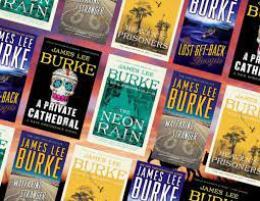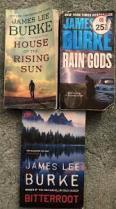A QUESTION THAT SOMETIMES FLITS THROUGH MY MIND
by Jule Selbo

James Lee Burke, age 87 now, is an American author who we know from the David Robicheaux series (17 books so far, by my count) and the Sheriff Hackberry Holland series (13 books by my count). He’s got a few Edgar Awards and he’s been presented with the Grand Master Award from the Mystery Writers of America, he’s got a CWA Diamond Dagger and a Gold Dagger and the Grand Prix of Litterature Policiere and he’s a recipient of the Guggenheim Fellowship for Creative Arts in Fiction. Some of his other books are historical fiction, some are collections of short stories about love and honor and survival, some are coming-of-age tales. He earned his Master’s in English and taught at universities and the Job Corps, served as a case worker for felons and the criminally insane, worked as a pipeliner, newspaper reporter, and long-distance truck driver. A NY Times reviewer suggested his work is a bit like Faulkner, a bit like Sartre and – then, of course, a lot like James Lee Burke.

 I was excited to see he wrote an introduction to a crime/mystery book I was reading and settled in to see what he had on his mind. This is what he wrote (I am cherry- picking the best parts, the ones that resonated the most to me):
I was excited to see he wrote an introduction to a crime/mystery book I was reading and settled in to see what he had on his mind. This is what he wrote (I am cherry- picking the best parts, the ones that resonated the most to me):
James Burke: “I have always been puzzled by our collective tendency to place American writing into categories, particularly when the categorical description is not meant to be complimentary… Terms like ‘mystery’ and to some degree ‘crime’ fiction have connotations that may not be derogatory but are hardly laudable, at least not laudable in the way the categorical terms ‘literary’ fiction and ‘metaphysical’ poetry, and my all-time favorite, ‘metafiction’ are used.”
Burke continues: “Academics do not teach James M. Cain, even though he is one of our best writers – his novel Mildred Pierce is arguably as good as any book Henry James wrote using a female protagonist. By the same token, I would suspect most academics would probably not want to call Robert Stone’s Dog Soldiers a crime novel, even though its subject is heroin smuggling and the moral insanity of a profligate society. Why not? You got me. Perhaps books that win the National Book Award are automatically excluded from the crime-novel category….
More Burke: Edna Buchanan and I both blurbed for The Black Echo (by Michael Connelly). I’d like to quote from my words…

‘…one of the most authentic pieces of crime writing I’ve ever read. When Connelly takes you into a tunnel beneath the earth, either in Los Angeles of Vietnam, you feel that you’re entering a domain of moral darkness that only Joseph Conrad could adequately describe…’
Continuing to quote Burke: “We forget sometimes that the genre begun by Edgar Allan Poe was actually a metaphor, at least for Poe, about the decay of Western civilization. James M. Cain once said that the premise of all his plots was the tragedy that befalls us when we eventually get what we want…”
Now this is just me, Jule: Just some of the “oldies” I admire that got me into the crime/mystery genre when I was a kid: John Fowles, Martin Cruz Smith, Graham Greene, P.D. James, Patricia Highsmith, John Le Carre, James M. Cain, Umberto Eco, James Lee Burke, Daphne Du Maurier, and a whole whole whole bunch more.
Among the hall-of-famers of my crime/mystery youth:






Le Carre…Smith… duMaurier… Fowles………. Highsmith….. Cain





Eco…. Greene………… Christie…. Chandler …. P.D. James
As a lifelong reader of all genres, I am continually gobsmacked when I hear (or overhear) the denigration of the crime genre, the romance genre, the horror genre, disaster genre, western genre, comedy (humor) genre and others – those that are not embraced under ‘literary fiction’. Novelists dedicated to examining the whys and wherefores of characters and situations, of good and evil, or morality and immorality, of ethical and unethical behaviors – for me, it’s all one stewpot. And that’s what my favorite books explore.
I can appreciate all sorts of stories, but I am partial to crime/mysteries because of their strong story engines, the creation of actions that garner great consequences, the building of puzzles of who-done-what-and-why, the examinations of malfeasance and evil and selfishness and of those who try to find some semblance of justice in the world.
Like James Lee Burke, I wonder why – just why – why sometimes the respect (in certain circles) for the crime/mystery writer is not up there at the top. I know you all have opinions that will edify this quandary that flits through my mind – just sometimes.
Would love a list of your “old” favorites to add to mine.
Lea Wait's Blog
- Lea Wait's profile
- 509 followers



